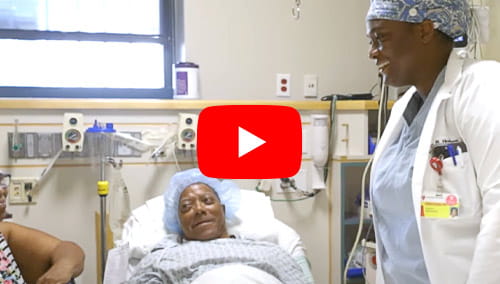
Brain Tumor Program
For patients diagnosed with a brain tumor, nationally renowned UH Seidman Cancer offers the latest advancements in diagnosis and treatment. As one of the best cancer hospitals in the country by U.S. News & World Report for over 20 years, UH Seidman Cancer Center is part of the National Cancer Institute (NCI)-designated Case Comprehensive Cancer Center at Case Western Reserve University School of Medicine – one of an elite group of 53 such comprehensive cancer hospitals nationwide.
Your health is important. Make an appointment today.
Offering in-person, video and telephone visits. Call todayto see which option is right for you. 216-844-3951
Learn more about virtual visits
Providing Personalized, Compassionate Care for Patients with Brain Tumors
Patients can be confident that they will receive the most advanced medical care possible at UH Seidman Cancer Center. Working as a tightly knit multidisciplinary group, our surgeons, oncologists and cancer care support team provide a comprehensive cancer care program of diagnosis, treatment, clinical research trials and support, aiming for a cancer cure.
What Is a Brain Tumor?
A brain tumor is a growth or mass of abnormal cells in the brain. A number of different types of brain tumors exist, some of which are cancerous (malignant), while others are noncancerous (benign). Tumors can develop initially in the brain (primary brain tumors) or else begin in other parts of the body and spread to the brain as secondary brain tumors (metastatic brain tumors).

Types of Brain Tumors
More than 120 different types of brain tumors have been identified. Tumors can develop first in the brain (primary brain tumors) or else originate elsewhere in the body and spread to the brain as secondary brain tumors (metastatic brain tumors). Brain tumors are named based on the type of cell in which they formed and/or where the location in the central nervous system (CNS) where they originated. In addition, brain tumors are classified into grades based on how abnormal the tumor cells appear under a microscope, the tumor’s rate of growth and the likelihood of the tumor spreading.
What Are Brain Tumor Symptoms?
When a tumor grows into or presses on part of the brain, it may prevent that part of the brain from functioning correctly. Although both malignant and benign brain tumors cause signs and symptoms, symptoms of brain tumors do not manifest the same in every person.
Specific signs of brain tumors depend on the following:
- Where in the brain the tumor forms
- Function(s) of the affected part of the brain
- Size of the tumor
Brain cancer symptoms may include:
- Morning headache or headache that goes away after vomiting
- Seizures
- Vision, hearing and speech problems
- Loss of appetite
- Frequent nausea and vomiting
- Changes in personality, mood, ability to focus or behavior
- Loss of balance and trouble walking
- Weakness
- Unusual sleepiness or change in activity level
Note that possible brain cancer symptoms can be caused by other types of tumors of the central nervous systems as well as by other conditions. Consult your doctor if you have any of the above symptoms.
Brain Tumor Causes and Risk Factors
Experts do not yet fully understand what causes brains tumors . However, we do know that mutations or defects in genes may cause cells in the brain to grow uncontrollably to form a tumor. Many such gene changes are likely random events that occur inside a cell without an external cause.
Potential brain tumor causes and risk factors include:
- Cancers that spread from other parts of the body (metastatic cancers)
- Certain hereditary conditions that predispose a person to the overproduction of certain cells – these conditions include:
- Neurofibromatosis
- Von Hippel-Lindau disease
- Li-Fraumeni syndrome
- Familial adenomatous polyposis
- Lynch syndrome
- Basal cell nevus syndrome (Gorlin syndrome)
- Tuberous sclerosis
- Cowden syndrome
- Family history of brain tumors: A small amount of brain tumors occur in people with a family history of the condition
- Exposure to radiation: The only known environmental cause of brain cancer is exposure to large amounts of radiation from X-rays or during previous cancer treatment.

Innovative Research Leads to New Opportunities in Care
University Hospitals is an affiliate of Case Western Reserve University School of Medicine, a nationally recognized leader in clinical research. UH Seidman Cancer Center currently conducts a number of clinical trials for patients with brain tumors, giving patients access to new and innovative therapies and treatment options.
Personalized Brain Tumor Treatment
A nationally recognized cancer program, UH Seidman Cancer Center has expertise in both standard and complex care for brain tumors. Working with specialists from University Hospitals Neurological Institute’s Brain Tumor and Neuro-Oncology Center, our multidisciplinary team of experts has devised innovative, minimally invasive approaches to treatment and participates in the most advanced clinical trials from Case Western Reserve University School of Medicine, Case Comprehensive Cancer Center and the Adult Brain Tumor Consortium.
We offer the five primary treatments for brain tumors, personalizing treatment plans based on each patient’s unique needs. The primary types of treatment for brain tumors are:
- Active Surveillance
-
This approach involves closely monitoring a patient’s condition but not giving treatment unless test results indicate the condition is worsening. Active surveillance may be used to avoid or delay treatments such as radiation therapy or surgery.
- Surgery
-
Surgery may be used in both the diagnosis and treatment of brain tumors. Surgical removal of the tumor helps lessen pressure on nearby parts of the brain. Working closely with specialists from University Hospitals Neurological Institute’s Brain Tumor and Neuro-Oncology Center, our fellowship-trained neurosurgeons utilize the latest advances in surgical intervention to treat brain tumors, including:
- Minimally invasive brain tumor surgery: This type of surgery includes techniques through which our neurosurgeons can view detailed images of the patient’s brain with the use of a small camera.
- Fluorescence-guided surgery: UH Seidman Cancer Center neurosurgeons have pioneered use of special fluorescent markers (such as 5-ALA) to facilitate precise identification of the borders of a brain tumor, helping the surgeon remove more of the tumor while minimizing risk to the brain.
- NeuroBlate®: This revolutionary type of laser interstitial thermal therapy destroys brain tumors with a magnetic resonance imaging (MRI)-guided laser. UH Seidman Cancer Center is one of only a handful of hospitals in the world to offer this minimally invasive treatment for previously diagnosed untreatable brain tumors.
- Intraoperative MRI: With specialized intraoperative MRI suites, we use magnetic resonance imaging to track surgical progress in real-time
- Radiation Therapy
-
Radiation therapy involves the use of high-energy x-rays or other types of radiation to kill cancer cells or prevent them from growing. Using a machine outside the body, external radiation therapy sends radiation directly toward the area of the tumor. Radiation therapy is often recommended after surgery and may be administered in combination with chemotherapy. For patients who cannot undergo surgery, radiation therapy and chemotherapy may be used as a primary treatment.
Among the innovative radiation technologies we use in the treatment of brain tumors is:
- GammaTile®: This surgically targeted radiation therapy involves the placement of a bioresorbable, flexible collagen tile within the brain immediately following tumor removal.
- Proton therapy: UH Seidman Cancer Center is the first hospital in Northeast Ohio to offer this innovative, powerful and technologically advanced therapy. Effective for both adults and children, proton therapy has less side effects than other forms of radiation therapy, resulting in better quality of life during treatment, while also reducing patient risk for the development of radiation-induced secondary cancers decades after treatment.
- Stereotactic Radiosurgery
-
Stereotactic radiosurgery is a type of radiation therapy used to treat brain tumors and other cancers when conventional surgery is not an option due to safety concerns. Stereotactic radiosurgery differs from traditional radiation therapy in that stereotactic radiosurgery involves the use of precisely focused radiation beams. Unlike traditional radiation therapy, stereotactic radiosurgery exposes very little if any normal tissue to radiation.
Stereotactic radiosurgery is often recommended after surgery and may be administered in combination with chemotherapy. For patients who cannot undergo surgery, stereotactic radiosurgery and chemotherapy may be used as a primary treatment.
Innovative stereotactic radiosurgery technologies we use in the treatment of brain tumors include:
- Gamma Knife®: An accurate form of stereotactic radiosurgery for the brain, this technology pinpoints a single area with numerous gamma radiation beams without damaging surrounding healthy tissue.
- Varian Edge™: This advanced, high-focus radiation beam radiosurgery system targets the DNA in cancer cells, destroying the cells. Unlike other radiosurgery systems that require the use of a rigid frame to secure a brain cancer patient’s skull during treatment sessions that can last several hours, Varian Edge delivers equally precise treatment without requiring a frame in as little as just a few minutes.
- Chemotherapy
-
Chemotherapy uses drugs to stop the growth of cancer cells, either by killing the cells or preventing their division. When taken orally or injected into a vein or muscle, chemotherapy drugs enter the bloodstream to reach cancer cells throughout the body (systemic chemotherapy). Chemotherapy placed directly into the cerebrospinal fluid is called intrathecal chemotherapy. Regional chemotherapy is when chemotherapy drugs are inserted in an organ, such as the brain, to primarily affect cancer cells in that local area. When suitable, we may use an innovative technique in which thin, circular wafers containing chemotherapy medicine are placed in the brain during surgery. These wafers dissolved slowly to provide the timed release of a medicine that kills cancer cells.
- Targeted Therapy
-
Targeted therapy is an approach to cancer treatment that utilizes drugs or other substances to identify and attack specific cancer cells. In general, targeted therapies inflict less harm to normal cells than chemotherapy or radiation therapy. Promising targeted therapies for brain tumors include monoclonal antibody therapy, tyrosine kinase inhibitor therapy and vascular endothelial growth factor (VEGF) inhibitor therapy.
Visit our blog to view brain cancer treatment news.
Brain Tumor Survival Rates
Outcomes for individuals diagnosed with a brain tumor vary considerably, and your doctor can never be absolutely certain about what will happen following a brain tumor diagnosis. Prognosis is often an ongoing process, revised at different stages of the care journey. Important factors that affect prognosis include:
- Type of tumor
- The tumor’s grade, which is an indicator of how rapidly the tumor is likely to grow and/or spread
- Location of the tumor
- Whether or not successful removal of all of the tumor is possible
- The patient’s age and overall health
A 5-year brain cancer survival rate indicates what percent of people live at least 5 years after a tumor is found. The 5-year survival rate for people with a cancerous brain or central nervous system tumor is 36%. The 10-year survival rate is about 31%.
However, age is a significant factor in general survival rates following brain tumor diagnosis. The 5-year survival rate for individuals younger than age 15 is more than 75%, while people aged 15 to 39 have a 5-year survival rate of more than 72%. The 5-year survival rate for people age 40 and over is about 21%.
Often malignant brain tumors can be successfully controlled through surgery and/or radiation therapy. Other tumors, even if they are benign (noncancerous), may be life-threatening due to their location in the brain. Other individuals with brain tumors live active and rewarding lives while experiencing little or no symptoms from their condition.

Patient Stories
Frances’ Story: The Stars Align
After years of catering to the stars, Frances Noonan has an eye for the best. The Colorado woman also knows one’s luck can change in an instant, and traveling for a better experience can be well worth the trip.
Why Choose UH Seidman Cancer Center for Brain Cancer Treatment?
Member of the Adult Brain Tumor Consortium, a consortium of 11 elite Centers of Excellence for brain tumors.
The first stereotactic radiosurgery suite in Ohio to offer Gamma Knife® technology for malignant and benign brain tumors
The first hospital in Ohio to offer proton therapy – an innovative, technologically advanced cancer treatment
The second provider east of the Mississippi to offer Medtronic’s Stealth Autoguide precision robotic platform for brain surgery
The first cancer center to offer GammaTile®, a form of radiation that dissolves in the patient’s brain after placement at the end of brain surgery
One of the leading centers in the country for minimally invasive (Laser Interstitial Thermotherapy) combined with immunotherapy
Dedicated Team of Cancer Care Experts
Just as each patient is unique, we believe that cancer treatment should be customized to fit the individual. As such, we offer patients a multidisciplinary team approach to treatment, where all our cancer doctors, nurses and support staff coordinate your care. In addition to fellowship-trained physicians, surgeons and radiologists, our compassionate, highly trained team of cancer experts includes:
- Genetic counselors
- Medical geneticists
- Medical oncologists
- Nurse navigators
- Nurse practitioners
- Pathologists
- Radiation oncologists
- Radiologists
- Social workers
- Surgical oncologists
Furthermore, our team meets weekly to conduct a disease-specific tumor board review. In a tumor board review, every patient’s case is read and discussed among a team of national experts at the meeting. The review process ensures that all realistic treatment options are considered.



